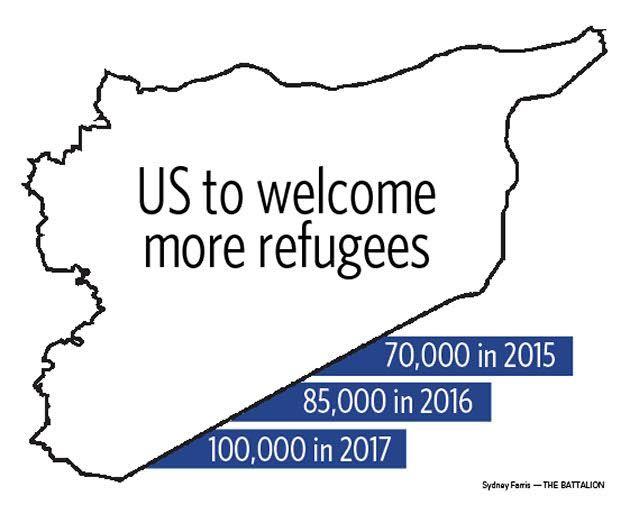As Syrian refugees continue to pour into European and Middle Eastern countries, the United States is now poised to accept a portion of the displaced.
Secretary of State John Kerry announced plans Sunday to raise the number of Middle East refugees admitted into the United States by at least 10,000 in 2016, raising the total number to around 85,000. He also announced plans to have at least 100,000 refugees in the United States in 2017.
The announcement comes days after Ryan Crocker, dean of the Bush School of Government and Public Service and former ambassador to Syria, sent a letter to President Obama, urging him to accept 100,000 Syrian refugees into the United States.
Crocker signed the letter, dated Sept. 17, along with a number of other former U.S. government officials, including former Deputy Secretary of Defense Paul Wolfowitz and former U.S. Ambassador to the European Union Kristen Silverberg. Crocker said their goal was to influence the United States to demonstrate leadership on the refugee issue.
“The way to demonstrate that leadership is to stand up and say we are going to make a major contribution to resolving this problem both by accepting a substantial amount of refugees ourselves and by ramping up our funding to the region, particularly Lebanon and Jordan,” Crocker said.
Crocker said the United States needs to not only step up, not only because this is the worst refugee crisis the world has seen since World War II, but also because of the lack of leadership in Europe.
“If the United States doesn’t lead, no one else will, and you’ll see what you’re seeing in Europe — different positions, squabbling, everybody pointing fingers,” Crocker said. “The U.S. is the world leader, and it has to act like it on this question.”
Crocker said answering the crisis is a moral obligation for the United States, and people should recognize this is an issue of American values.
“It says right on the Statue of Liberty, ‘Give me your tired, your poor, your huddled masses yearning to be free,’” Crocker said. “That’s who we are as Americans — we are a place of refuge.”
Andrew Natsios, director of the Scowcroft Institute of International Affairs and executive professor in the Bush School, said the refugee crisis is due to the chaos that has gripped several Middle Eastern countries.
“One of them is Libya. There’s no effective central government,” Natsios said. “Secondly, there is [chaos] in Yemen, there is [chaos] in Syria and in Iraq — four countries. Then other countries are having to have many refugees in their countries — Jordan, Lebanon, Turkey and Egypt — and those countries don’t have the capacity to care for all these people, and so they’re under stress themselves.”
As a former United States Agency for International Development administrator, Natsios said there are three things that he would do to answer the crisis — chaotic countries, prevent the crisis from destabilizing other countries and provide more help to the Kurds.
The Kurds are a group of people living in a region spanning Turkey, Iran, Iraq and Syria. Natsios said they are secular, pro-Western, pro-American and deserve more help from the United States in the fight against ISIS.
In considering the effect on Europe, Natsios said it’s important to look at the refugee crisis in the context of Europe’s other problems, including the Russian invasion of Ukraine and the struggling economies of Greece and other European Union nations.
“It’s going to change the power dynamics in Europe,” Natsios said. “Europe will pay much greater attention now to what’s happening in the Middle East than they have and will maybe work with us in a more aggressive way on a solution.”









